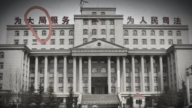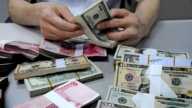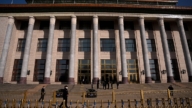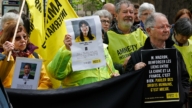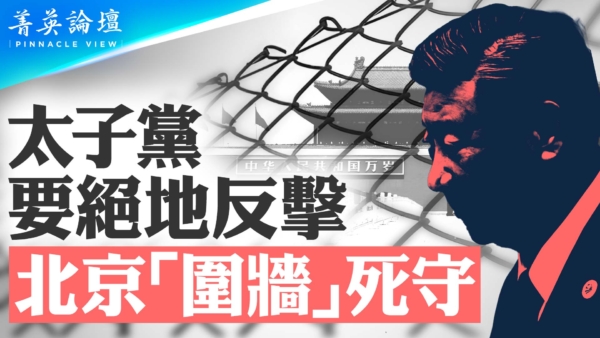【新唐人2011年12月9日訊】近年來,大陸的收入差距持續呈現擴大的趨勢。「廣州社情民意研究中心」針對北京、上海、廣州三坐城市,做了一個民意調查,日前發佈的調查報告顯示,三個城市的居民生活呈現兩極化特徵,草根基層滿意度不到兩成。經濟學家表示,自從中共執政以來,中國沒有形成中產階級,造成貧富差距則是必然的。
上個月,「廣州社情民意研究中心」對北京、上海、廣州三個城市,電話訪問了2001位市民,涉及基礎生活感受、人際關係感受、社會參與感受、生活服務感受、人生價值感受等七個類型共23個指標,收入水平決定個人滿意度。結果顯示,在「個人住房」、「個人收入水平」、「社會和福利保障」三項指標,低收入階層不滿意度明顯高於滿意度。
經濟學家謝田表示,中國當今社會通貨膨脹嚴重,房地產價格、醫療衛生保健、教育這些成本都在上升,老百姓生活質量越來越下降。
謝田:「中共當年以土地作為誘餌,來忽悠發動農民來進行它們奪取政權的暴力鬥爭。到後來建立中共政權以後,實際上是通過對資本主義工商業的改造,把所有的工商企業收為國有。而中國農業合作化把中國農民土地收了回來。直到今天為止,中國老百姓從來就沒有真正的擁有房地產的真正產權。而企業,實際上最大的、最主要的工商企業,實際上都是中共的國有壟斷性的國有企業。它們佔據整個中國經濟的70%以上。」
謝田指出,中共通過這一系列從農業土地到工商企業國有化和國家壟斷,經過高層它們自己的裙帶關係、和他們附庸關係的人,全面掌控這些壟斷性企業,而老百姓腳下沒有屬於自己的土地,手上也沒有生財的股票和其他有價證劵,在通貨膨脹的情況下,人們只好看著自己的收入遠遠趕不上通貨膨脹的水平。這樣就造成了中國經濟貧富分化的現象。
現年60歲的江綿恆是江澤民的兒子,根據《江澤民其人》一書披露,1992年江澤民手握黨政軍大權後,為了讓江綿恆趕快「悶聲大發財」,1994年,江綿恆用數百萬人民幣「貸款」買下上海市經委價值上億元的「上海聯合投資公司」,而開始他的「電信王國」生涯。到2001年,江綿恆已經成了中共「官商一體」的最高代表。
謝田:「中共的權貴,包括中共幾百萬,上千萬的各級幹部,各層那些官員,那些有裙帶關係的中共官僚階層的人這群人和依附於中共的那些知識份子,也可能包括那些少數民營企業家,這些人的收入在過去的20年裡,迅速的增長。很快的增長,體現在他們那個房地產、股票市場收益,和其他資本收益上。」
中共喉舌《新華網》報導說,現階段中國出現的貧富差距問題,是發展中的問題。北京師範大學MBA導師、經濟專欄作家段紹譯則認為,特權參與分配財富是造成貧富差距的原因之一。
北京師範大學MBA導師、經濟專欄作家段紹譯:「主要市場經濟的轉型,它不是真正的市場經濟。管住市場多的人就容易得到更多的財富,管住市場少的人他的財富就很少。另外一點就是這些特權平分這些財富,往往真正財富創造最多的是有特權的人。」
謝田還強調,今天中國所有的問題,無論是貧富分化問題,還是整個社會包括造假,有毒食品、道德敗壞的問題,都是中共極權專制統治造成的。而解決這些問題的唯一辦法就是推翻中共。
新唐人記者陳漢、唐睿、薛莉採訪報導。
A Big Gap between Rich and Poor
In recent years, the income gap in mainland China
has continued to show a trend of expansion.
Guangzhou Society And Public Opinion Research Center did a
survey in Beijing, Shanghai and Guangzhou.
The results showed that living in the three cities presents
a picture of polarization, and people’s satisfaction at root level was less than 20%.
Economists have said that since the Chinese Communist Party
(CCP) came to power;
China has not formed a middle class,
so the gap between rich and poor is inevitable.
Last month, Guangzhou Society And Public Opinion Research
Center conducted telephone interviews on 2,001 citizens
in Beijing, Shanghai and Guangzhou, the topics involved
basic life experience, personal relationship feelings,
social participation feelings, life service experience, value of
life experience, in all seven categories and 23 indicators.
Income levels determine individual satisfaction.
The results showed that low income people are not
more satisfied in ‘individual housing’, ‘personal income’,
and ‘social security and welfare’.
Economist Xie Tian said that in China today, inflation is serious.
Real estate prices, health care, and education costs are rising,
the quality of people’s living is getting lower and lower.
Xie: “In the past, the CCP used land as a bait to mobilize
farmers and seize power violently.
After the Chinese Communist regime was established,
the CCP transformed capitalist industry and commerce, and made them both state-owned.
In Agricultural Co-operatives,
the CCP collected land back from farmers.
Until today, the Chinese people have never really owned property,
while for businesses, the largest and most important industrial
and commercial enterprises are state-owned monopoly enterprises.
These occupy more than 70% of the entire Chinese economy."
Xie said that by a series of nationalizations and state monopoly
on agricultural land and industrial and commercial enterprises,
the CCP fully controls these businesses through
their own high-level nepotism and their client relationships.
People never own a property, do not have stock or other
marketable securities in hand to make money from.
In times of inflation, people had to watch their income lagging
far behind.
This has resulted in the phenomenon of polarization of
rich and poor.
Jiang Mianheng, 60, is the son of Jiang Zemin.
According to the book Jiang Zemin, it revealed that
after Jiang Zemin took military and political power in 1992,
in order to allow his son to ‘muffle and make big fortunes’,
in 1994, his son had used a ‘loan’ of several millions of RMB
to buy the Shanghai Joint Investment Company,
worth over 100-million-RMB and owned by the Shanghai
Economic Commission, and began his ‘telecommunications kingdom’.
By 2001, Jiang Mianheng had become the highest
representative of ‘official and commercial one body’.
Xie: “China’s elite, including tens of millions of cadres at all levels,
all levels of officials who have the CCP bureaucracy nepotism,
intellectuals attached to the CCP, and may also include a few
private entrepreneurs, these people’s income in the past 20 years,
has had rapid growth, reflected in their real estate figures ,
stock market returns, and other capital gains."
The CCP mouthpiece Xinhua News Agency reported that the
gap between the rich and poor in China is a developing problem.
Duan Shaoyi, MBA advisor at Beijing Normal University and an
economic columnist,
believed that the privileged participating in the distribution of
wealth is the reason causing the gap.
Duan Shaoyi: “The main market economic transformation is
not a true market economy.
The people who take control of the market are likely to
get more wealth, and vice versa.
Another point is that those who have privileges will divide
wealth equally among themselves ,
and those who have the most wealth are always those who
have more privileges ."
Xie also stressed that all the problems in China today,
including the polarization between the rich and poor, fraud,
toxic food, and moral declination problems are all caused by
the CCP』s totalitarian dictatorship.
The only way to solve these problems is to overthrow the CCP.
NTD reporters Chen Han, Tang Rui and Xue Li


